My kitchen table, laden with some of the loveliest grief gifts I ever did see, including homemade soaps (thanks Krysia!), a plant that Fiona custom-ordered (while in Barbados!) from local plant shop Wild Roots, and a squishy alien that lights up which I squeeze at least once a day (thanks Lena!) / Gulfport, FL // June 2025
My chiropractor called me out a few weeks back.
He said, with his characteristic smile (he has nice little teeth), “I read your essay.”
“You did? Thank you for reading,” I began, genuinely surprised and moved.
“But I still don’t know what to say!” he admonished. “You only told us what not to say!”
Then he gave me an enormous cashmere-scented candle in a plastic bag.
This was not apropos of nothing. I mentioned that scent in the essay.
Y’all. I love it. It has pride of place in my grief gift tableau (upper righthand corner, with the flowery lid).
I enjoy looking at them all together, all those love offerings. They take up a little more than half of my kitchen table. Only one person can eat there at a time now, and they can’t really spread out when they do, know what I mean? I do love a good surface. Little altars everywhere.
Candles and bath bombs and soap, squishies & grippies and flowers, tea & sympathy cards. Pieces of thoughtfulness, physical manifestations of people’s desire to help in some way, even a small one.
A close-up of Fiona’s giftplant, who has yet to receive a name. I name all my plants, because then I will talk to them more often and consequently, take better care of them. I currently have an Artemis, a Serafina, and a Raising Arizona 2 (RIP Raising Arizona the first). Several others await The Naming. In fact: Do you have a name for this little sweetling? / Gulfport, FL // June 2025
I can tell you that it’s not small. It’s not small to me. And it probably wouldn’t be small to your person either. But if you give it the old college try, if you read this missive and still feel like you don’t want to say anything, okay, friend, that’s alright.
How about dropping off or mailing them a little gift instead? It needn’t be expensive. It needn’t be new. It just needs be thoughtful. Even if they can’t absorb it in the moment they receive it, I can almost guarantee you that it will mean something.
When in doubt, give a gift.
That giant cashmere candle, so big it has not one but FOUR wicks, means something. And then he had to go and ruin it. (jk, jk, Dr. Brian!)
“Hang in there,” he said, at the end of our session.
I cringed a liddle. (That’s not a little, not a lot, it’s right in the middle, a liddle.)
But you see, he was completely right! I told him I’d give him a list! I hadn’t given him a list! So I began compiling. Every time someone said a thing that made me wince, it went on the list, which lead to Part 1:
what NOT to say when someone dies
Little altars everywhere. This is the one I created next to the couch where I slept while my mother was on her deathbed. Some of the objects on it are: my cousin’s art, my mother’s watch, my father’s signature burned into wood, my grandmother’s prayer card, a rock painted by my friend’s mom & the mourning armband she made for me, my father’s wedding rin…
Each time someone said a thing that felt like love, made me farklempt, I took a screenshot, and it went on the list.
This is the farklempt list.
As I wrote in “what NOT to say,” the useful things people say are fairly varied (and tailored to the griever), while the un-useful things tend to be generic variations on a tired theme.
“what TO say” will be a living document, updated whenever I have something useful, or supremely un-useful, to add. Here we go.
what to say
A text exchange between myself and Owen, my friend, the great psychiatrist, writer, audio creator, & uber-compassionate human. He’s a Frontier Psychiatrist, and creates a Substack I recommend with all my heart.
There are what-to-says sprinkled throughout “what NOT to say,” (for contrast, y’know?) and here are more, many of them pulled directly from messages sent to me over the past 3 months, after my brilliant friend Craig died of bladder cancer in Brooklyn at age 49, my Dad dropped dead on his doorstep in upstate NY, and my Mom had an undiagnosed stroke, then died 5 days later, holding my hand in Florida.
Some of these phrases are repeats, but that’s a good thing, bb. We’ve gotten “I’msosorryforyourloss” so deeply ingrained in us, we need to play some other records over and over again to get more useful scripts in there.
We need to remix that shit.
Here are some words for when someone’s loved one is nearing the End end.
while they are dying (to the dying):
You’ve been a gift to this world. Thank you for being here.
Let them know how they’ve been a gift, too.
Whatever’s next, may it be light, free, and filled with beauty. (Ibrahim)
What do you hope it’s like for them? Maybe describe the glory you imagine. The Hospice Nurses told me that hearing is the last sense to go. “She can hear you,” they said.
May your Spirit rest with ease and peace. (Egbesola)
Just sounds so much more heartfelt than “May you rest in peace.” I’m not against the sentence or the sentiment, mind you. Just the cliché. Obviously not everyone would be receptive to hearing this on their deathbed, so use your discernment.
I love you and I wish you peace. (Rev Ben)
Simple and sweet.
You inspired me to [insert their impact on you here]
What could be more meaningful a legacy? Tell them of their legacy that lives on in you.
[Sing something instead]
“In the end, it’s always music,” said the death doula.
Music, especially music from their teenage years (which is apparently stored in some special compartment of the brain or tickles your brain in a very particular way and thus affects you differently than all other music) can make miracles like dementia patients doing the twist without their walkers, a la Awakenings.
When all else fails, music can still get in there.
I had the great honor of being present at the deathbed of my friend Kristi Ann’s grandmother. In order to not feel like an interloper, I became the entertainer. It made me feel like I had a legitimate reason to be by her bedside at that sacred time.
I was told she loved Sinatra. I pulled up lyrics on my phone and sang any songs I recognized to her, as best I could. The family chimed in quietly, their voices a little unsure, but willing. I didn’t know if it was doing her any good, until I saw her little toes moving. Her toes were dancing. They were dancing. The last part of her, it seems, that she could activate.
I also sang Sinatra to my dying grandmother when I was 24. There’s a little about that in this poem.
While my mother was on her deathbed I played her some of her Brazilian cd’s, bossa nova and fado and MPB (Brazilian Popular Music). I chose some of the great divas: Marisa Monte, Cesária Évora, another really famous one I can’t recall right now. I didn’t want it to be too loud, but I didn’t want it to be too quiet either. I couldn’t really ask her, or rather, she couldn’t really tell me (attempts made by my cousins to get her to “blink once if yes, two if no,” were failures), so I tried to strike the right balance without feedback. Like many of the decisions I made for her over the past year and almost-a-half, of more or less consequence, I could only choose what I thought would be rightest thing, or at least, the less worse thing, and then hope.
I didn’t see her toes move, but then, she was wearing socks (more on her feet later later, in-another-piece later, because they were heartbreaking and I can’t face them right now).
I do know that when the Hospice Music Therapist, Matt, came to play guitar for us on the first day I sat vigil, she had been making circles in the air with one arm (her dominant arm, her left one) for hours, unable to form words or make sounds. And a combination of the adavan (thank you Hospice), the morphine (bless you Hospice), & the soft strummings of Matt’s guitar, allowed her to rest. And me. Allowed me to rest, too.
Thank you Adam Peters, Happiness Ambassador for the video, and the flowers / May 5th, 2025 // St. Petersburg, FL
while they are dying (to the grieving):
I am beaming you good juju. (Me)
I love good juju. And this tends to work for peeps (like me!) for whom ‘thoughts and prayers’ isn’t going to land.
My heart beams your way. May peace be with you in these tender times of transition.
Oh these are tender times indeed. And I can use all the peace I can gather. Also, transition is the only euphemism for death that I can stomach.
Wishing them a peaceful transition.
Yes please.
I wish for moments of peace for you in these difficult times. (Kostar)
Yes to peace.
Holding you both in my heart during this sacred time. (Ibrahim)
It helped me to think of it as a sacred time.
Keeping you in my warmest thoughts… ✨🙏🏽😌💓 may her love and guidance forever be with you (rraz22)
Lovely, and doesn’t require anything of the griever.
My heart goes out to you as you navigate this time. I am sending Light and Love for [her] to depart peacefully and comfortably, and sending further loving energies to support you. (Carol)
From my father’s ex, about my mother, but also appropriate for many many other humans.
Powerful initiations, huh? Lifting you up during this time of change. Grief. Sorrow. Love. (Bianca)
I think ‘initiations’ are a particularly powerful way to frame the loss of one’s parents. As a lovely human on Substack put it, “Becoming the adult, the final adult.”
Ufffffff.
Agghhh.
Loudly crying face emoji.
You are loved and not alone. (Zachary)
Everyone can use this reminder from time to time. I perhaps more than most, but, perhaps not, if we really get down to it.
Most of us could probably use this reminder, most of the time.
Please tell her I’ve asked my mother to greet her and guide her and make her journey and arrival joyful. (Joey)
This one made me weep.
You inspired me to …
I could not share a more exquisite example than this:
at any point in the death process:
Hello I love you that is all for now.
I regularly text this to my friends, grieving and non-grieving alike. It’s just best practice. I don’t want to leave any I love yous unsaid. Do you?
No need to respond. I just wanted to say ...
I love you.
You’re the bee’s knees. The cat’s pajamas. The dog’s tuxedo.
You are one of my favorite humans on the planet.
You are on my heart.
You are in my heart.
I remember when we […]. It meant [this] to me.
I understand.
I overstand
I feel you.
I feel for you.
I feel for you so deeply.
I feel with you.
I feel with you, deeply.
I resonate.
I get it.
I can imagine!
I’ve been through something similar.
My heart hurts with you.
My heart hurts for you.
Ufffffffffffff.
Fuck.
Oh honey!
Oh, my dear [insert name here].
If you insist on mentioning how hard this is, consider:
This must be so hard. Or:
What a baptism of fire!
Etc.
They may not have the wherewithal to give you a response for a while. Knowing that you don’t expect one transforms a message that could feel like a task or a burden, into a blessing and a benediction.
Offer them that. Who doesn’t need blessings and benedictions?
Sending you breath.
Every time I see that text I take a deep breath. That’s a gift in itself.
(Not a directive, you notice. There is a chasm of difference between “Take a deep breath” and “Sending you breath.” One is an order. The other is an invitation. Resist the impulse to give orders at a time like this. I know, I know, this whole essay is orders.)
My heart!
Oh, your heart!
An exclamation of solidarity.
More heart:
My heart is beating with yours. (Missa)
Holding you in my heart. (Mel)
I hold your heart in my heart. (Me)
I much prefer these to any sorries. No sorries. I don’t really want anybody to be sorry. Except for the evil overlords. I want them to be very sorry. I want them to be so sorry that they save our planet and everyone on it.
My heart aches for you and I’m holding you in light and love ❤️🙏🏼 (Jenny)
Expresses feelings, doesn’t burden, lets them know you are thinking of them.
I feel with you!
An empathy exclamation.
Are you safe? (Pamela)
V. important question, especially if someone has recently gotten the news.
Would you like to talk about it together?
Would you like to not talk about it together?
Ask both of these at once.
They may want to talk, but they very may not. And if nobody has offered them not-talking together time, this might be just the right medicine at the right time.
What do you want me to know?
What would you like to share with me? (Simone)
This one is perfection. It acknowledges loss and offers space for anything a person might want or need to share. It doesn’t press or pull. It is a door left open without a sentinel. They can walk through at any moment. They can also decline to walk through, or hover on the door step. Compassion awaits, any way.
I have this, this, and that. May I bring any or all of them over for you?
In the spirit of multiple choice, I love this. Simone did this beautifully. Because she knows.
I have pictures of cats (insert: dogs, otters, sloths, lemurs, Ryan Gosling, in accordance with the grievers preference)? Would you like some?
Videos of cats are definitely a love language of mine which Julene & Adam speak fluently.
Hi friend, what is your mailing address? I’ll be sending you a care package. (Mike)
Who doesn’t love a care package? And all they have to do is provide their address! Yes!
May I come by and bring you food?
Oh gosh please yes.
May I do x, y, or z thing for you?
(Note for the griever: To invite this kind of offer, or if they happen to offer something that doesn’t work for you, you can always ask:
“Can I get a multiple choice?”)
Here are some real-life examples of multiple choice in the wild, in an exchange with my glorious brilliant badass fren-tor (friend + mentor) Pamela Samuelson:
after the death process:
I grieve with you.
And I with you.
I’m sending so much love to you and your loved ones, in this world and the next.
Thank you.
I don’t know how to express the sadness I feel for (your/) our loss.
This is Morgan Freeman’s character in the movie Transcendence, which I watched on the plane a few weeks back. Death, love, AI, and technology. Recommend.
“I don’t know how to adequately express my sadness” is quite different to me from some variation of “I don’t know how to help.” I think it’s because it gives voice to the sadness but doesn’t put pressure on the grieving person — who is far closer to the nuclear blast of death — to figure something out for you. Here you are admitting your own struggle, but not implicitly
asking them, the griever,
to help you
figure out
how to support them.
Believe me, they don’t need the homework.
Blessings your way. Grace. Peace. Comfort from the divine intelligence.
I accept.
May their memory be a blessing.
A Jewish benediction. Always falls warmly on me.
May the soil be easy on them.
May the soil be light on them.
A benediction from Eastern Europe, and from Spain. Also falls warmly on me.
Sending hugs and grounding energy as you navigate [compounded] loss 💔 (Ruby)
From a virtual stranger. Lovely. My losses were compounding. I felt seen.
Similar:
I’m sending so much love and care to you through the heartbreak on top of heartbreak ❤️ (Lauren)
Received in the spirit (in which it was intended).
Much love to you in this heavy time of grief and the myriad of emotions right now, dearest. You deserve to mourn in the ways best for you and your relationship with [your mom]. (Kai)
It is perfect.
They would completely understand why you are heartbroken and they would feel the exact same way if roles were reversed.
This is a rewrite of, “They wouldn’t want you to be sad,” composed by therapist Rio Richards over on her excellent Instagram-based grief resource and that’s grief.
Oh really? Is that so? You know what they would or wouldn’t want, do you? And they wouldn’t want me to feel sad, eh? But I do feel sad. But they wouldn’t want me to, is what you’re saying? Gee, thankyousomush for supercharging* my sadness with that Super Mario mushroom of guilt.
Yo.
Don’t try to guilt people out of their sadness because you are uncomfortable with it. It is you who doesn’t want them to be sad, you, not the dead person! I know you’re coming from a good place-ish, but. Unhelpful, friend. Unhelpful.
*hat tip to Max Cameron
funeral time:
My father’s casket / Endicott, NY // April 12th, 2025
Thinking of you, remembering [them], and celebrating [their] life.
Use their name in place of ‘them.’
People can be afraid to say a dead person’s name, as though it doesn’t belong in their mouth now. But. It’s still their name. Don’t be weird. (Not this kind of weird, anyway. This kind of weird can make your grieving person feel like you’re trying to erase their beloved. Don’t do that.) Say their name.
And if you have some specific thing (or many specific things) that you celebrate about them, share that too.
The gift is in the details you recall, and the impact they had on you.
My prayers go up to [her] today in gratitude and celebration. (James)
Sometimes you love them vicariously, because they loved a person you love, or, perhaps, created a person you love. Grief echos are real; grief shadows are real.
There is Finnish expression I learned from a commenter in the NYTimes: Otan Osaa. It means I will take part in your grief and loss. Yours is a heavy load. By sharing with us, we are now carrying a tiny piece, and I hope that helps to comfort you.
This one brings me to tears. This is why sharing, itself, is worthwhile. The adage goes “a burden shared is a burden halved.” And okay, maybe not exactly halved, but at least the tiniest bit diffused, widened, spread out across your community. Otan Osaa.
Wherever [they are] now, I hope whatever is left of [them] swims in a vast knowing of enoughness and love. (Me)
I spoke these words in the eulogy I gave on May 17th, 2025. It went like this:
All my mother cared about was love: capital L Love, and the truth of it was that she never received enough of it to feel satiated. Maybe you do know that about her. I, I think this is the great tragedy of her life… and I have been carrying the great tragedy of her life in my life, and respectfully… I'm going to put that down now.
My mother was the unhappiest and loneliest person I've ever known up close. It is my great hope... that wherever she is now, whatever is left of her swims in a vast knowing of enoughness and love.
You can watch, listen to, or read the rest of it here:
eulogy for a mother, mine
Flowers upon you, mãe / Sula Donnolo’s Celebration of Life // The Unitarian Universalist Church of St. Petersburg /// St. Pete, FL //// May 17th, 2025
It is my dearest hope that you are surrounded by love in the weeks and months to come.
In the days that follow death, love (in action) is pretty easy to come by.
But after about a week and a half, mayyybe two weeks, the actual and metaphorical casseroles disappear, people reclaim their pyrexes, the cards and phone calls and texts stop rolling in, and… the slippage can begin.
So, if you are willing and able to, be part of the second wave, the second line. Not the vanguard (or, the vanguard too, if you have the bandwidth) but make yourself part of the crew that comes behind them.
Be a janitor of emotion, a loving presence of after-aftercare: after the students and teachers have gone, when even the extracurricular captain-my-captains, those lifesaving band leaders and theatre directors and volleyball coaches are at home eating ice cream in their pajamas.
Truly, a gift or a meal or a card or a call 3 weeks later, 3 months later, means all the more.
If you can show up when the others have gone, please do it.
Trust me.
May their spirit soar. (Kesh)
I hope. I hope. I hope so.
Flowers upon you, mãe / Sula Donnolo’s Celebration of Life // The UU Church of St. Pete /// May 17th, 2025
To sum up:
Acknowledge their pain.
You can do that by sending care, or speaking of your own heart. It don’t gotta be ‘Hey I know you’re in excruciating agony and emotionally bleeding out right now.’ No need to tell them how they feel, knowwhatImean?
Tell them specifically what you are available for, and when.
Key word is specifically. Don’t use innuendo or vague language — have you ever had griefbrain, yourself? If you haven’t, sorry to report, you will. And you’ll know precisely why I told you to be specific.
Offer things you have access to, and desire to offer, both.
What would bring YOU joy to offer? Would they like that? Excellent! Offer those things.
Send benedictions & blessings instead of sorries.
Sorry is for when you’ve caused harm. Did you kill them? Maim them? Trigger the series of events that caused their death? No? Good. Nothing to be sorry about then.
The poem gios_typos wrote for me at the city of St. Pete’s Shine Pride pop-up. He asks you to share a brief story (brief stories are challenging for Lila!), and then you sit with him as the typewriter goes clickety-clack, clackety-click— always a soothing sound for me — and then he gives you this gift in a beautiful envelope. / St. Petersburg, FL // June 2025
Hang on, I’ll show you.
So, darling, can you see a pattern?
My “what to says” all have a few things in common:
No directives. No advice. No requirements. No asks.
No clichés.
Compassion. Empathy. Lovingkindness. Gifts.
Offers.
This is the way.
I love you,
Lila

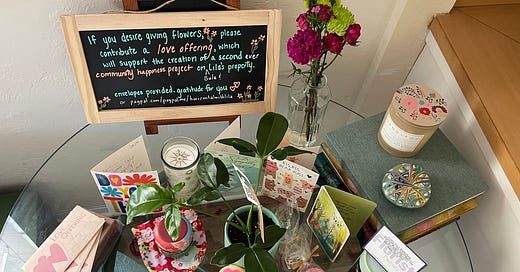



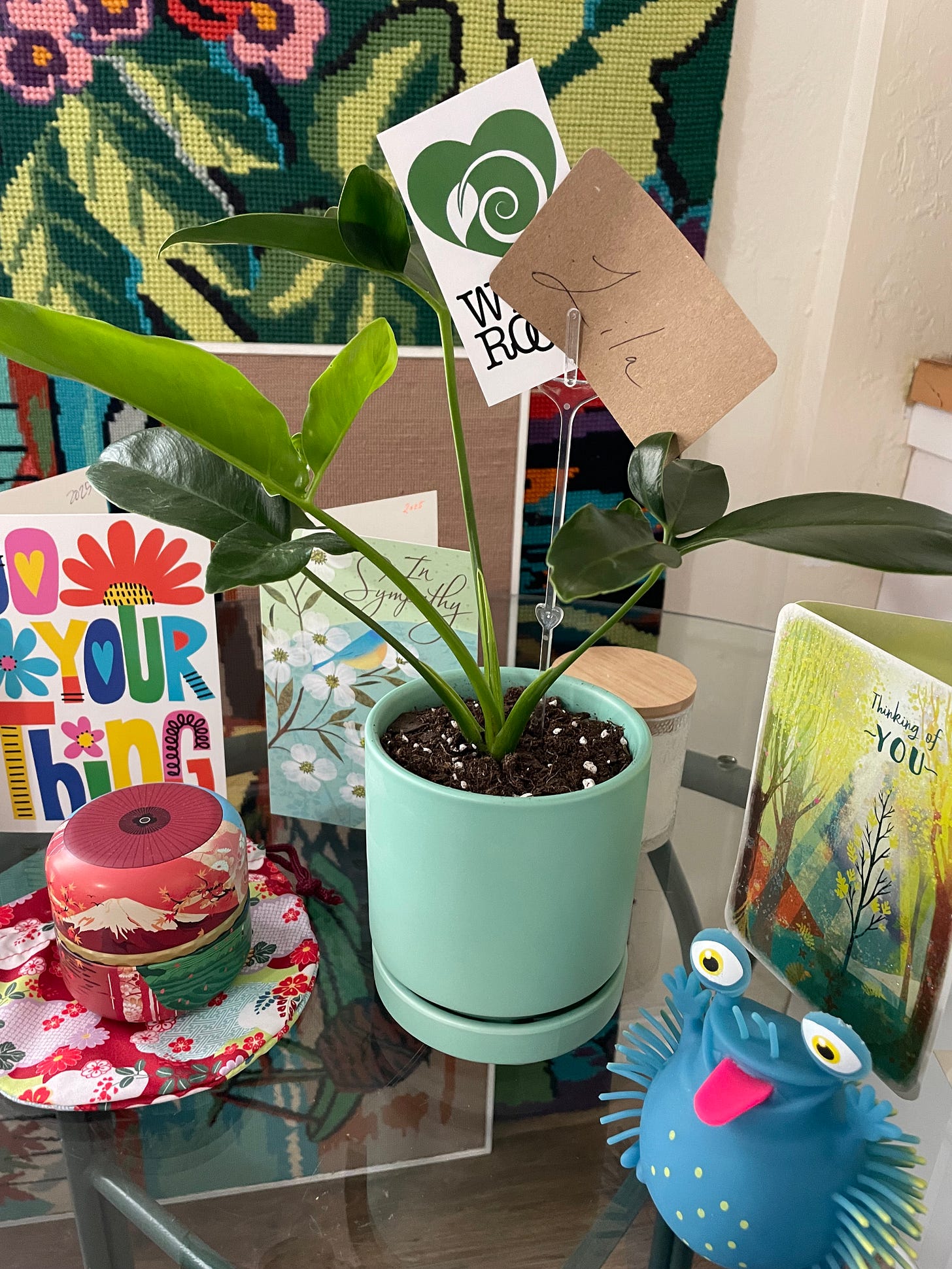
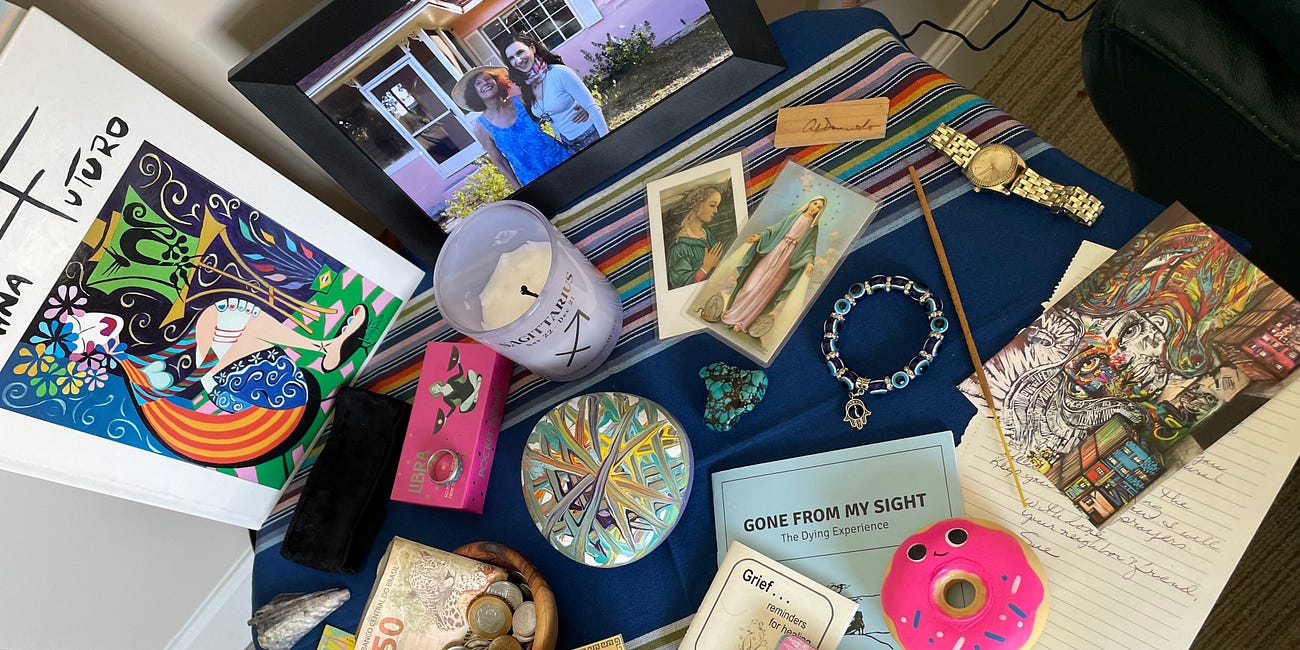
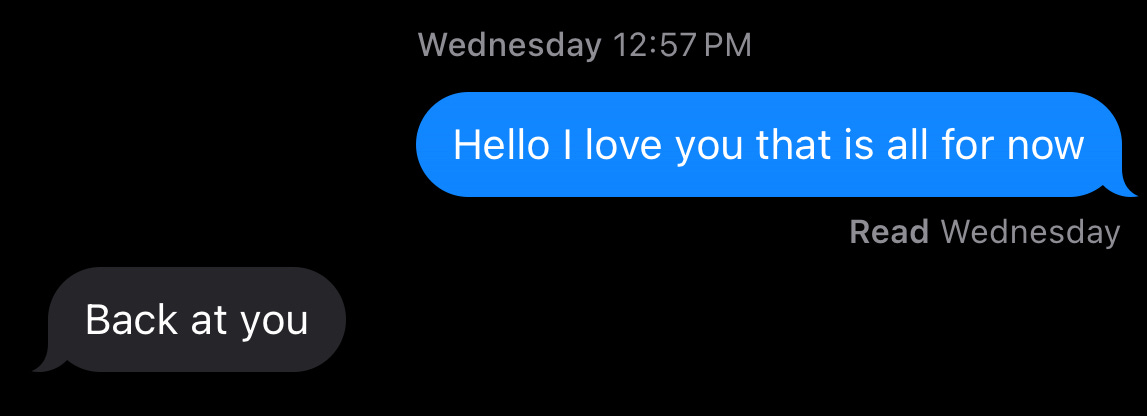
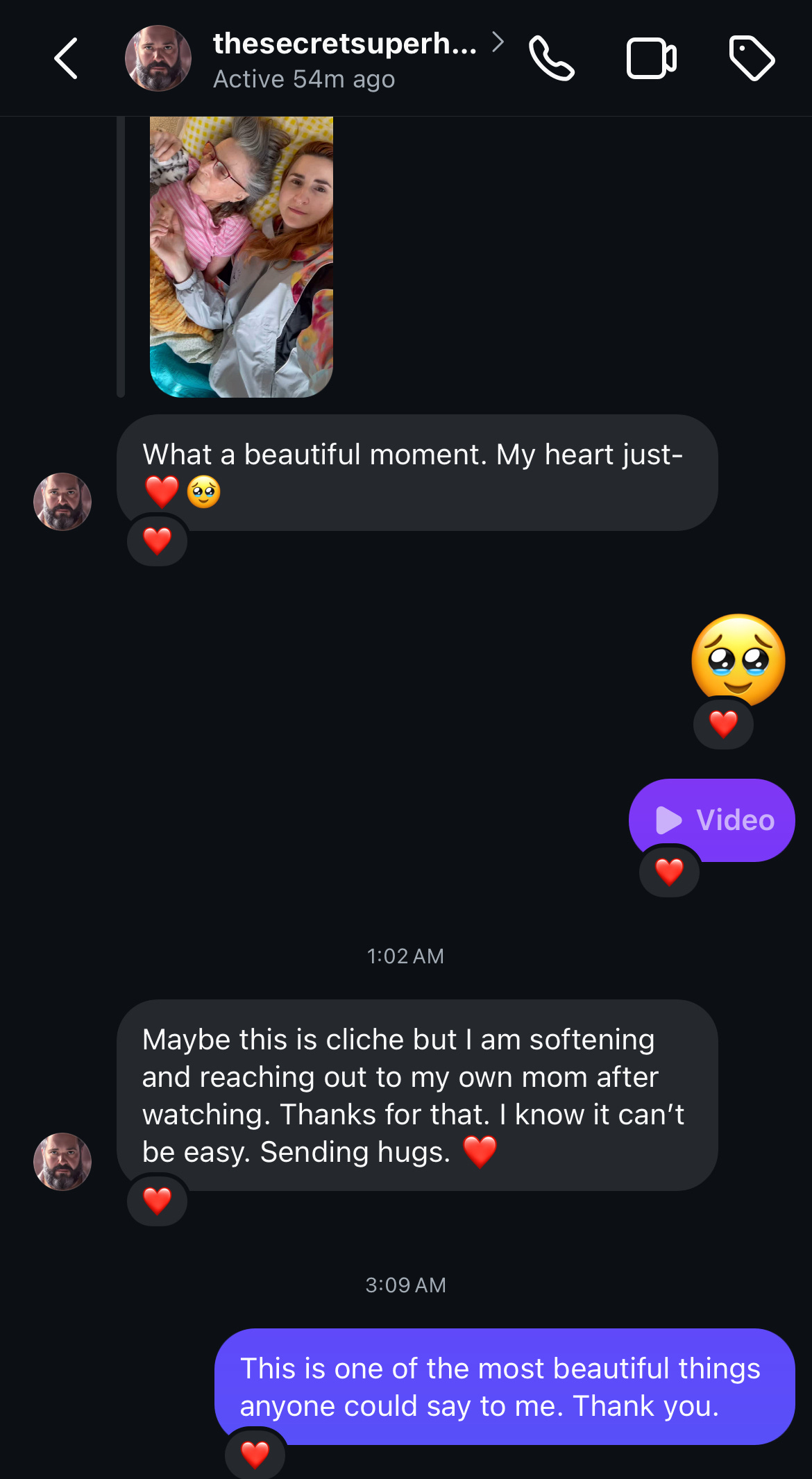
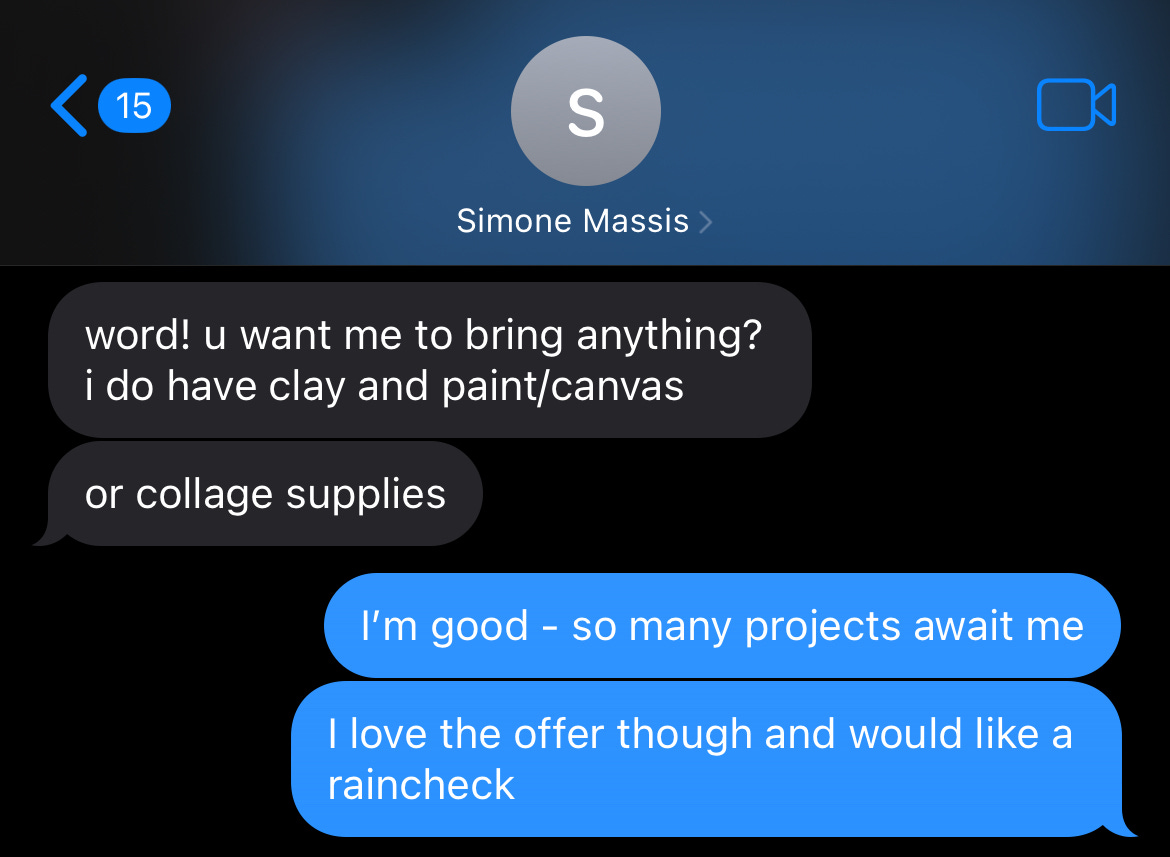
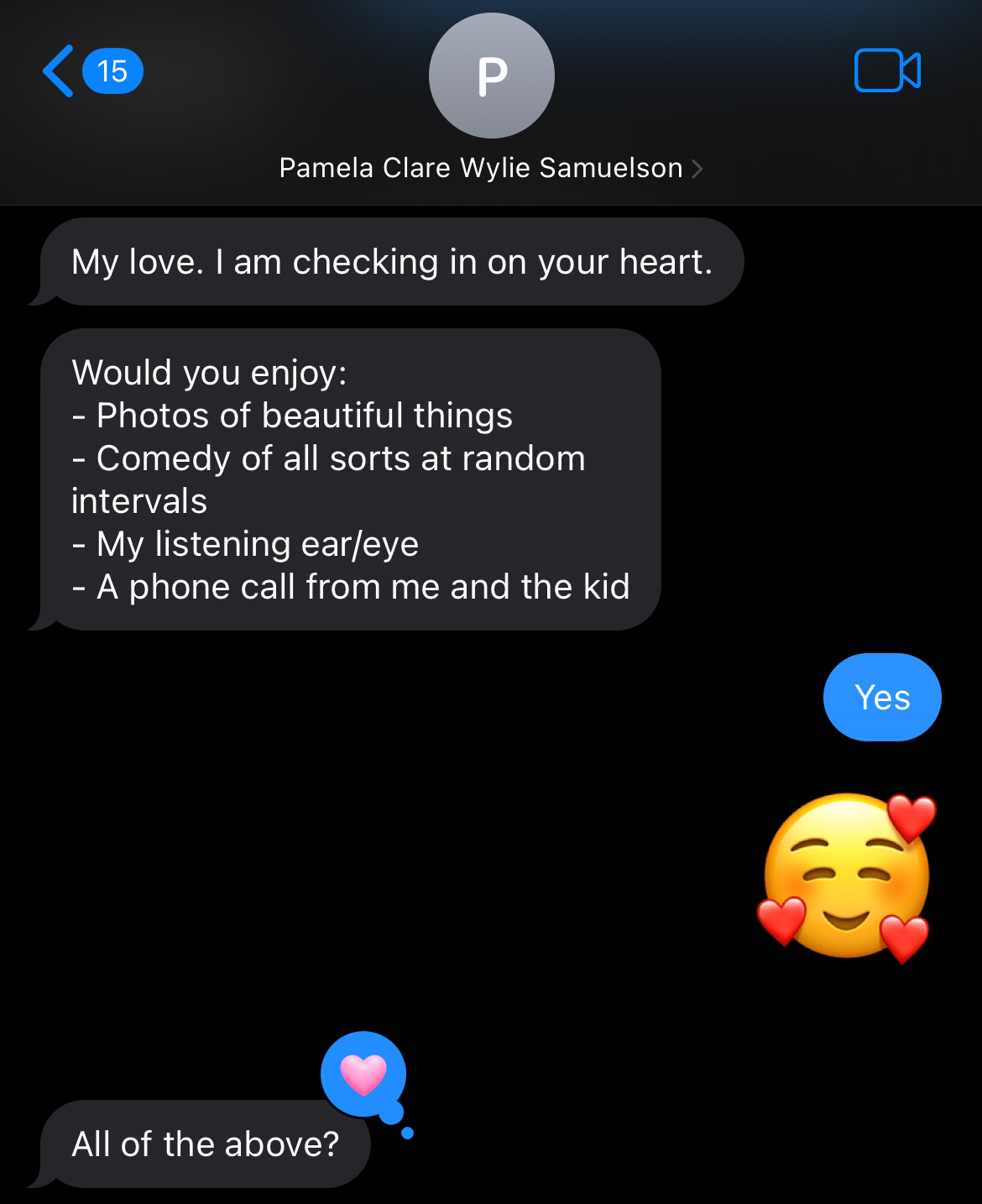
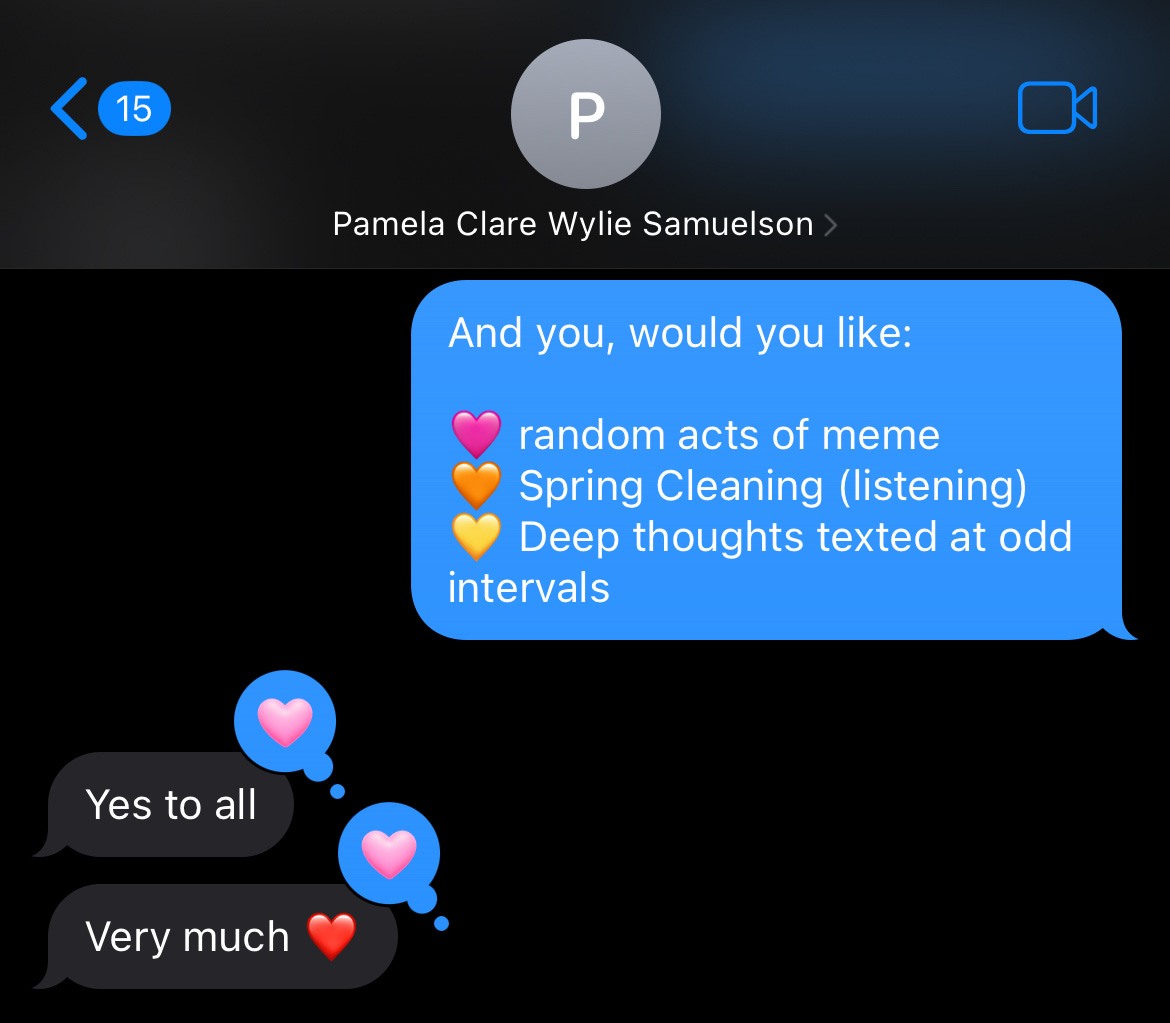
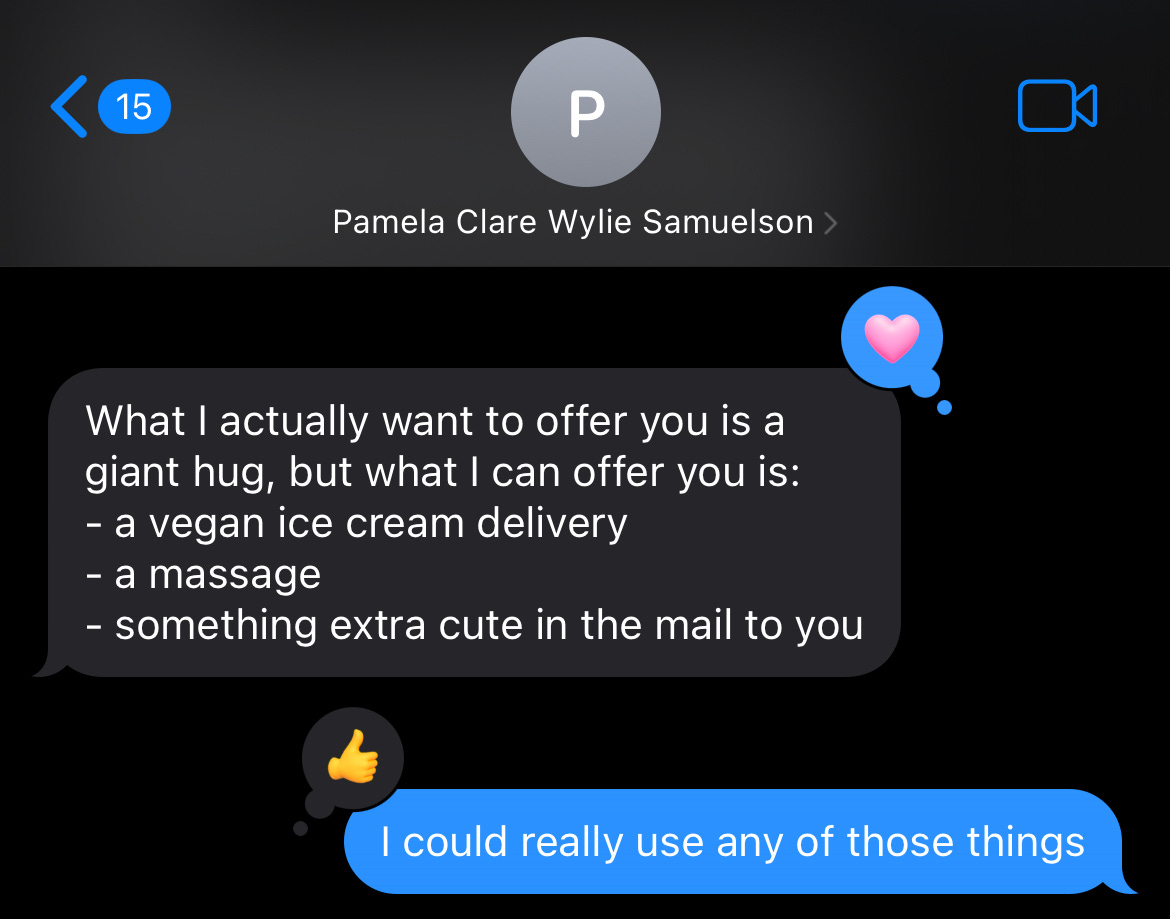
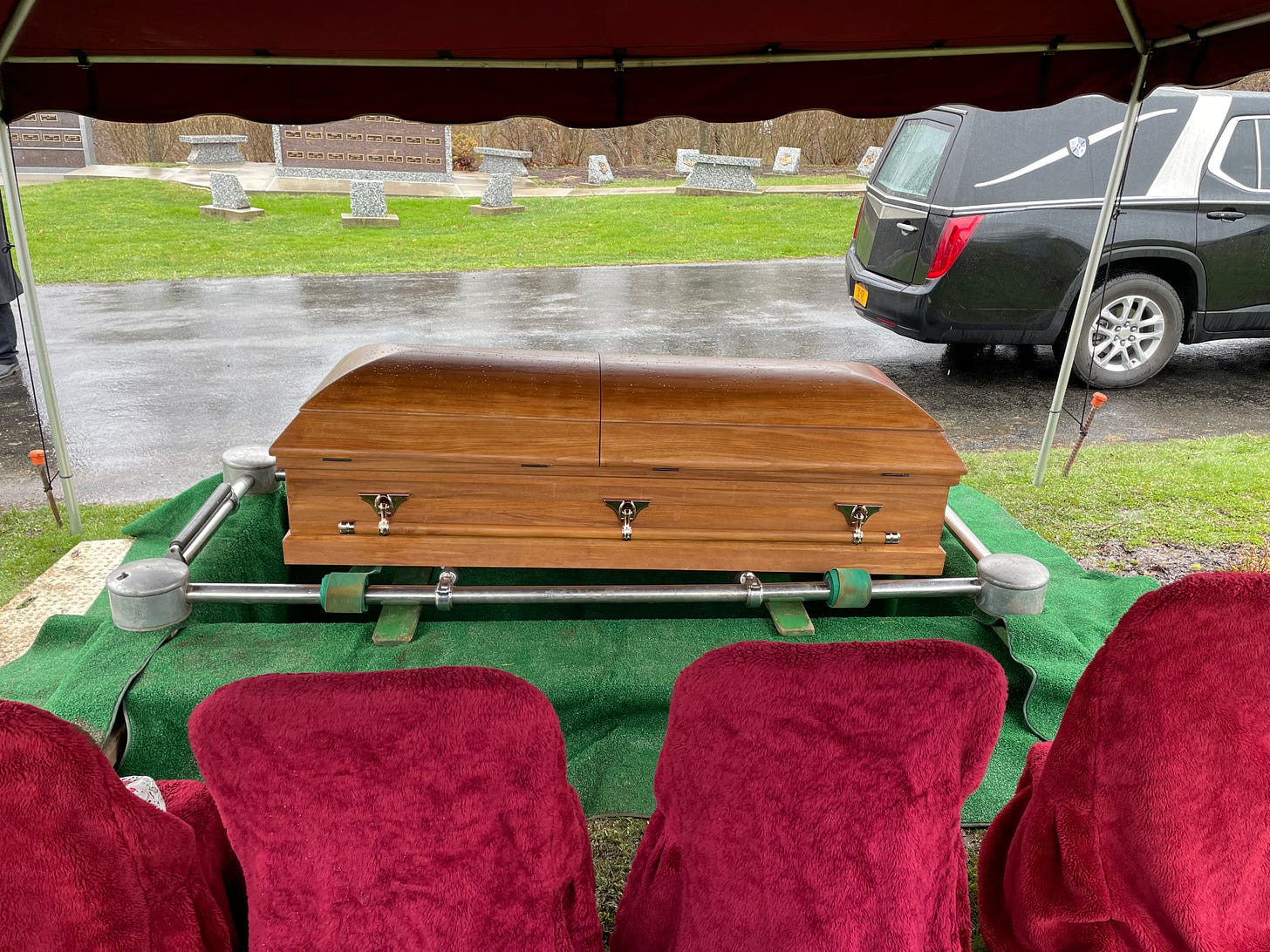

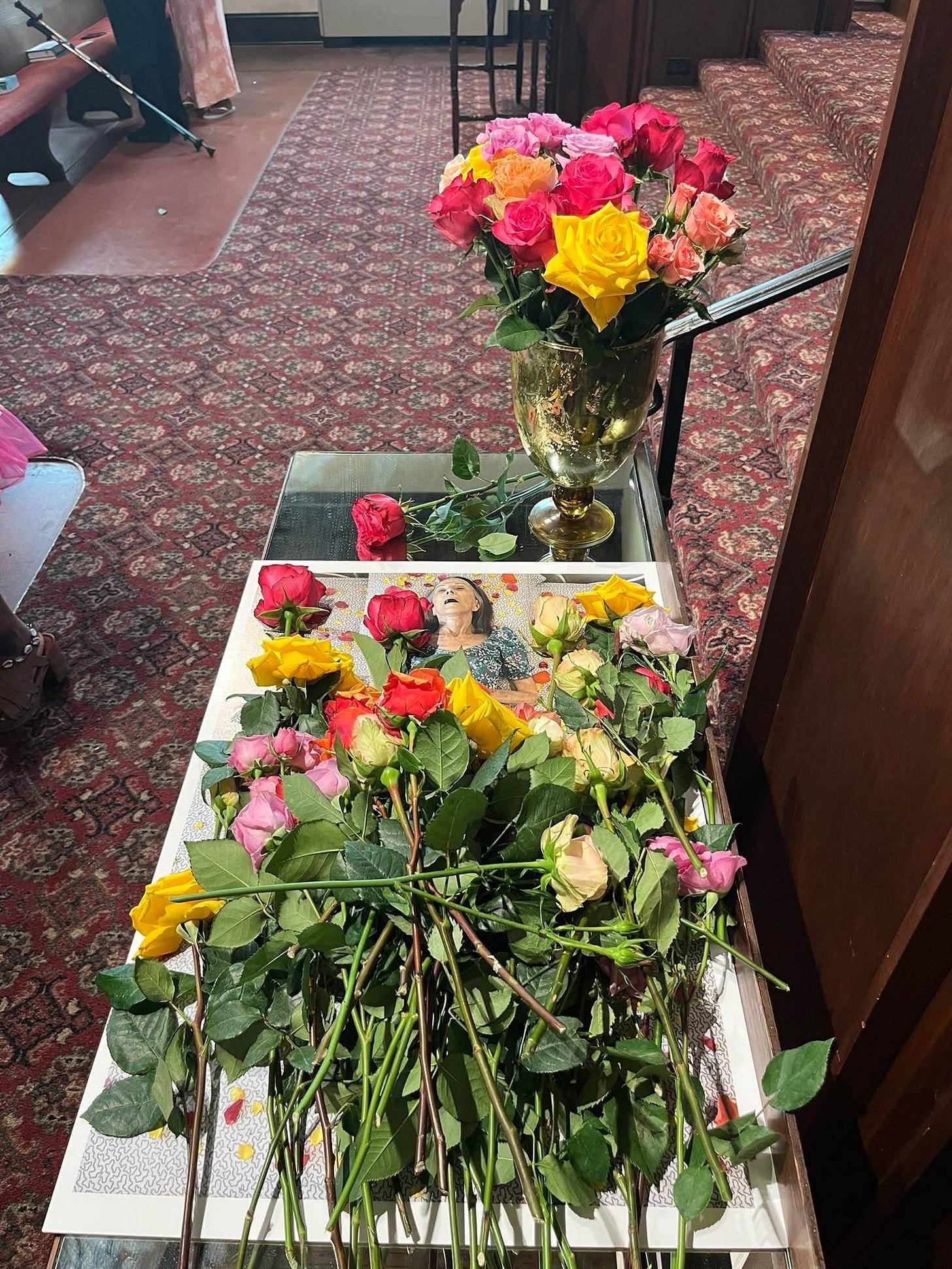
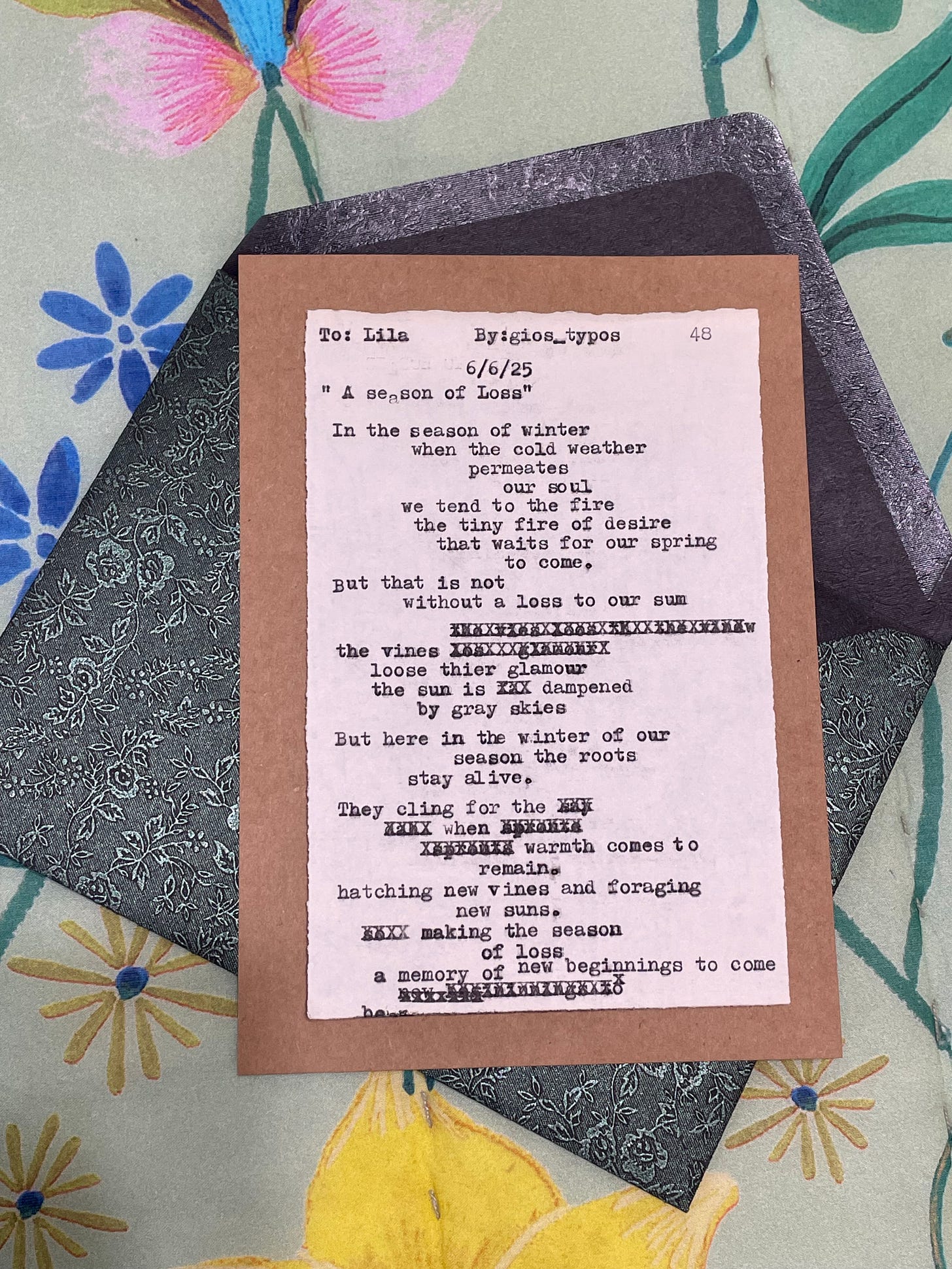
This is so deeply informative, thank you.